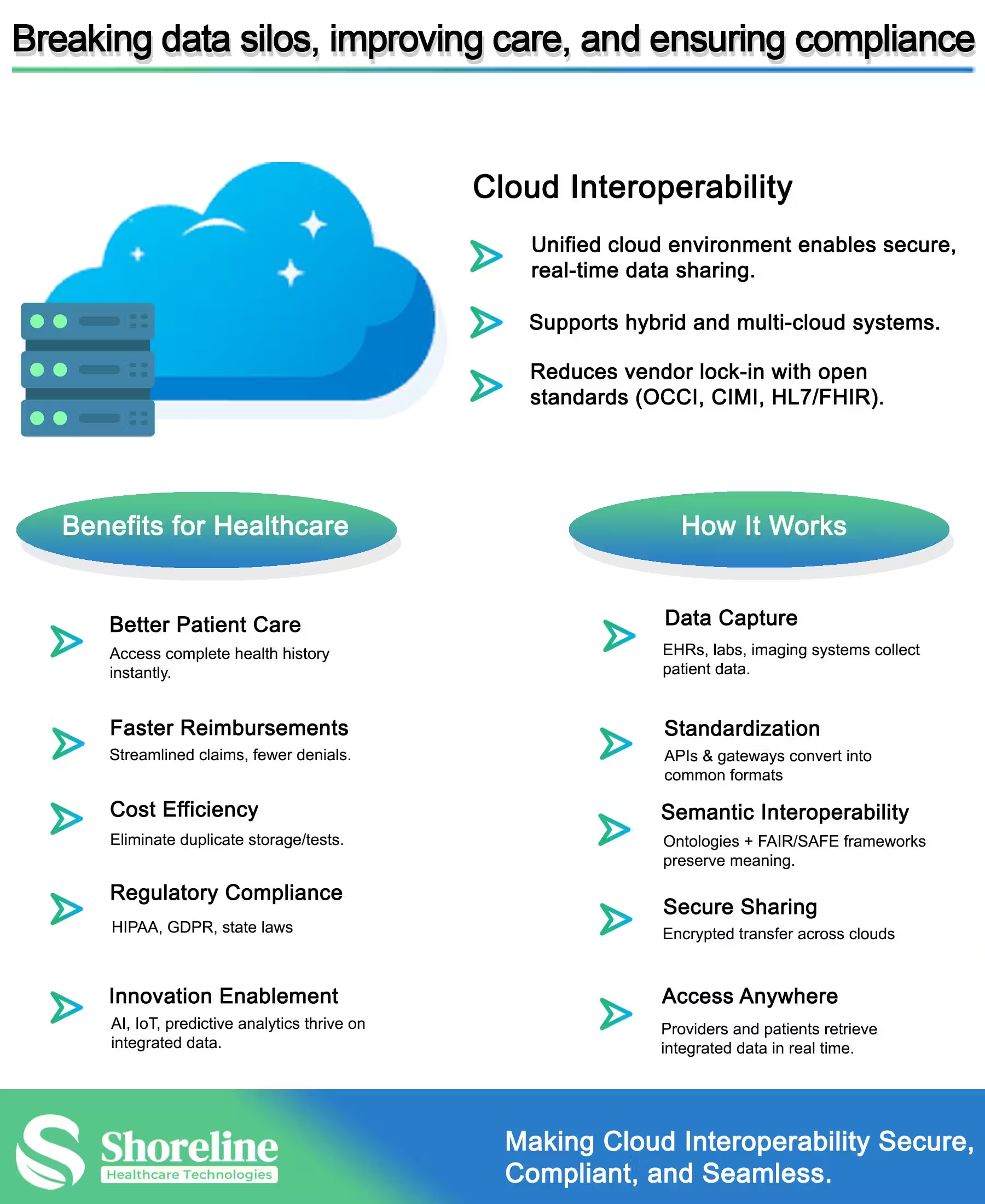Interoperability and Data Sharing using Cloud Computing
One of the main struggles of healthcare industry is to maintain the data integrity and provide a secure information exchange platform. With Cloud data portability providers can maintain a competitive advantage and increase their operational flexibility. In this blog let us see how understanding and implementing robust interoperability standards helps in automatic data access and facilitate secure transmission across multiple cloud computing environments.
What is Cloud Interoperability?
Cloud interoperability is various applications, systems and services integrating with each other and working together for a smooth exchange and use of information. It enables secure data transfer across multiple cloud environments like public, private, or hybrid models.
- ✔ It helps in data portability across various cloud environments.
- ✔ Allows applications to interact via standardized APIs.
- ✔ Prevents organizations from vendor lock-in and gives flexibility.
The concept extends beyond simple data transfer. It provides a standardized protocols with consistent data formats for communication. So that all applications running on different cloud platforms can interact with each other without any difficulties.
Why Is Cloud Data Sharing Important?
Healthcare Industry solely rely on accurate data for its operation. With the old traditional systems, it is difficult to exchange and use this information effectively. Cloud computing eliminates this difficulty and helps to share data in a secure and efficient way.
- ✔ It enables real-time collaboration across providers, laboratories and payers.
- ✔ Supports regulatory compliance like HIPAA and HITECH.
- ✔ Reduces costs by removing duplicate storage and systems.
- ✔ Enhance AI/ML models through larger, standardized datasets.

How to Achieve Cloud Data Portability Across Platforms?
Data portability across cloud platforms can be achieved by open standards like OCCI, CIMI and API gateways. They help in secure and consistent data exchange between platforms.
Open Cloud Computing Interface (OCCI) is an open standard developed by the Open Grid Forum to manage resources like compute, storage, and networking across multiple cloud providers without being tied to proprietary tools. It reduces the risk of vendor lock-in by promoting portability and it is used as a bridge for multi-cloud and hybrid cloud environment.
Cloud Infrastructure Management Interface (CIMI) helps in managing the cloud infrastructure. It enables tasks like provisioning, monitoring, and scaling cloud resources and uses a common data model for consistent resource representation across providers. It provides cloud data portability and simplifies migration between clouds.
Application Programming Interfaces (APIs) provides standardized methods that enables systems to communicate and share data. The robust frameworks allow
- ✔ Data exchange formats that ensure consistent interpretation across platforms.
- ✔ Authentication and authorization protocols for secure cross-platform access.
- ✔ Workflow orchestration standards that enable complex processes to span multiple clouds.
- ✔ Metadata schemas that preserve data context during transfers.
We at Shoreline Healthcare Technologies deliver interoperable cloud solutions that helps hospitals to streamline their workflows, reduce administrative overhead, and speed up reimbursement cycles.
Interoperability in Cloud Computing: How Healthcare Benefits from Data Sharing
Breaking Down Data Silos
The daily operations of healthcare organizations involve juggling between multiple systems like EHRs, labs, imaging platforms, and payer databases. And without proper interoperability standards these data exchanges cannot be achieved. Cloud based environments helps by providing a secure, real-time data exchange platforms, so providers can easily access the complete details of the patients from anywhere.
We at Shoreline Healthcare Technologies, provide interoperability frameworks that connect siloed systems into a unified, secure network, reducing duplication and enabling faster decisions.
Supporting Continuity of Care
Cloud interoperability ensures that medical records are easily accessible from anywhere so that patient can have better outcomes. By allowing providers to access updated patient records instantly, it ensures continuity of care, reduces the delay in treatments, minimize the need for repeat testing thereby improves patient satisfaction and trust on the providers.
Enabling Multi-Cloud Strategies
Hospitals often use multi-cloud or hybrid models for their various needs like analytics, imaging and billing systems. With cloud enabled interoperable systems they can communicate and work together without any hurdles. It allows integration of various cloud models, reducing vendor lock-in, so providers can choose the best-fit model without worrying about compatibility.
Enhancing Compliance and Security
In healthcare, data exchange must balance between speed and strict compliances to protect sensitive patient information. Cloud platforms are built in with advanced compliance checks, encryption, and abide with regulatory frameworks like HIPAA and HITECH.
Powering AI and Advanced Analytics
Cloud environment allows integration of structured and unstructured data from different sources. And these data can be used by various AI models to generate predictive analytics, helps in health care management, and early disease detection.
Reducing Costs and Operational Inefficiencies
Manual transfers, duplicate storage, and repeated tests waste time and money. Interoperability cuts these inefficiencies.
Breaking Free from Vendor Lock-in
Vendor lock-in means organizations becoming more dependent on a single cloud provider’s technology, making it complex for them to switch providers or integrate with other platforms. This can be eliminated by adopting interoperability standards which establishes a common framework to work across multiple vendors.
Implementing an interoperable solution, provides several other benefits like
- Freedom to choose any cloud providers based on their performance, cost, or specific capabilities
- Risk mitigation through diversified infrastructure dependencies.
- Negotiating power with vendors when you're not locked into their ecosystem
- Innovation acceleration through access to best-of-breed solutions from multiple providers.
A multi-vendor environment becomes not just possible but practical when interoperability standards guide your architecture decisions. You can run workloads where they perform best while maintaining seamless data flow between different cloud environments.
Why Choose Shoreline Healthcare Technologies?
We at Shoreline Healthcare Technologies provides a HIPAA compliant secure platform to share data, and improve care delivery. We offer vendor-neutral expertise by working across various secure cloud platforms and follows state-specific laws. We provide tailored solutions for every practices irrespective of the specialties they serve. We offer end-to-end 24/7 support to providers from planning and migrating to cloud platforms along with ongoing monitoring and optimization.
FAQs
Q1. What is interoperability in cloud computing?
+It is the ability of various cloud platforms, applications, and systems to share and exchange data between them.
Q2. Why is cloud data portability important and what does it mean?
+The ability of cloud platforms to move data and applications across various cloud environment without losing its functionality or information is called cloud data portability. It is important because it avoids vendor lock-in, and gives the freedom to choose different cloud platforms based on their price, features, or performance.
Q3. How does Shoreline Healthcare Technologies help providers?
+We at Shoreline Healthcare Technologies deliver secure, compliant, and scalable cloud-based RCM solutions specifically customized for each practice and specialty.
Q4. Is ShorelineMB the same as Shoreline Healthcare Technologies?
+Yes, ShorelineMB.com is the official website of Shoreline Healthcare Technologies, a leading provider of medical billing and RCM services.

















Partner with Shoreline Healthcare Technologies for a secure, future-ready cloud-based healthcare ecosystem.